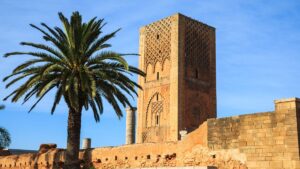Summary
- 1) Key Takeaways
- 2) 1. Moroccan Lanterns
- 3) 2. Argan Oil Products
- 4) 3. Berber Carpets & Rugs
- 5) 4. Leather Goods
- 6) 5. Moroccan Spices
- 7) 6. Ceramics & Pottery
- 8) 7. Traditional Tea Sets
- 9) 8. Moroccan Slippers (Babouches)
- 10) 9. Jewelry & Berber Silver
- 11) 10. Spiced Sweets & Pastries
- 12) Tips for Shopping in Marrakech
- 13) Conclusion
- 14) Frequently Asked Questions
Key Takeaways
- You will discover so many souvenirs to bring back from Marrakech: lanterns, carpets, leather and tea sets.
- Shop at well-known locations such as the Medina, Souk Semmarine, and Ensemble Artisanal to access authentic items and support local artisans.
- Seek out argan oil and spices at trusted cooperatives and certified stores.
- Haggling is the name of the game in Marrakech markets, so have some negotiating skills and cash at hand for most purchases.
- Buy a eSIM data plan with Ubigi to help you navigate souks and stay connected while shopping.
- If you want to be sure not to be scammed, opt for fixed-price shops or go for those recommended as authentic.
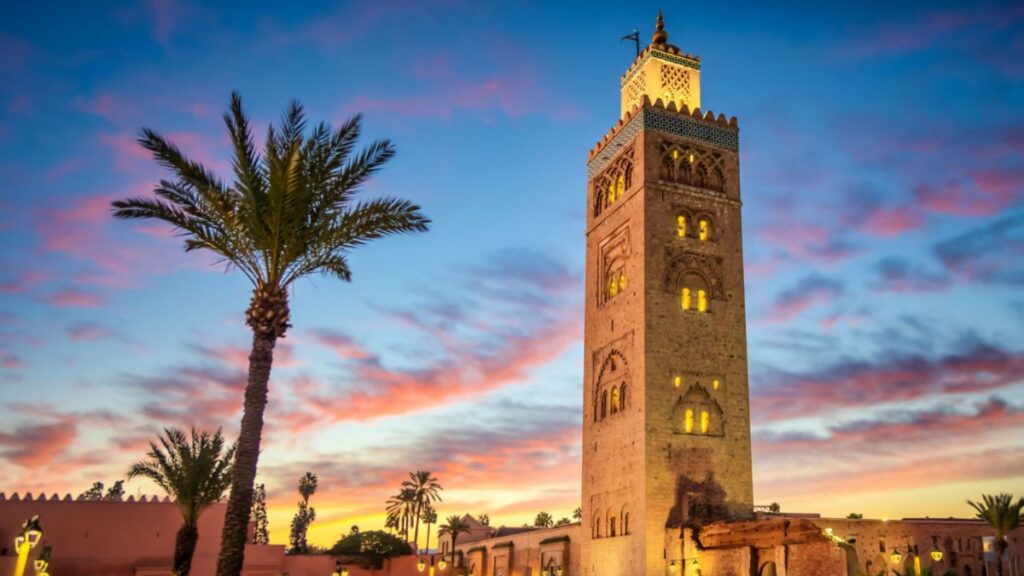
The coolest Moroccan souvenirs to bring from Marrakech souks are handwoven rugs, leather slippers, argan oil and colorful ceramics. The local souks are full of unique finds to suit many tastes and budgets.
Things such as traditional lanterns, brass trays, and spices are particularly striking, with their vivid colors and cultural association. You receive choices that combine fashion and functionality— beautiful decorative pieces that speak of this artisanal hub.
Each of these great picks helps you hang onto memories from your trip. Our list below spans 10 souvenirs to bring from Marrakech.

1. Moroccan Lanterns
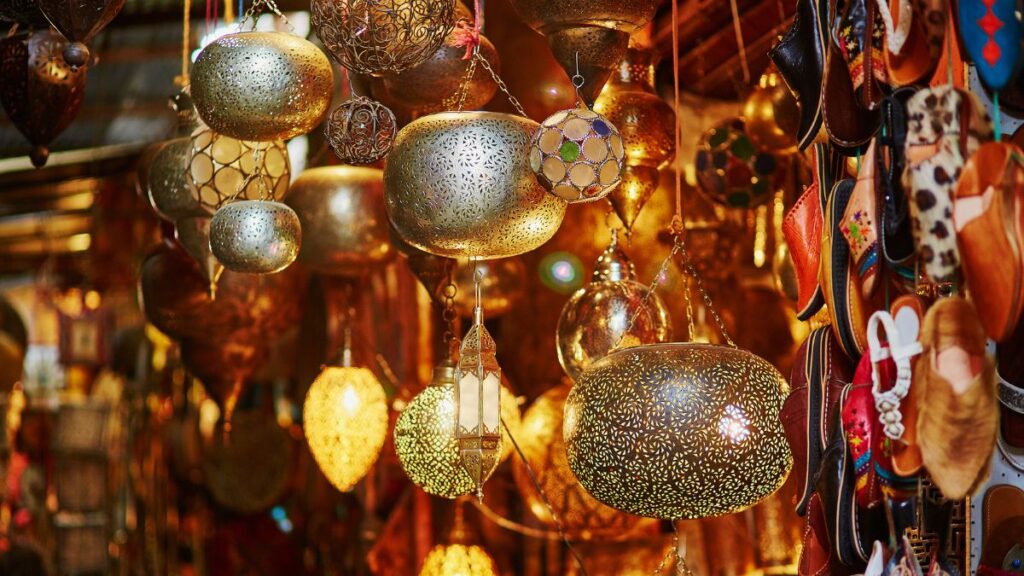
Moroccan lamps and lanterns , with their intricate metalwork on metal lanterns or stained glass, cast colorful, textured shadows on your walls. You’ll find these popular items in Souk Semmarine or lamp shops in the Mellah, where vendors sell a variety in size, shape, and color.
Most intricate lanterns are handcrafted with vintage metalwork or glassblowing techniques, so every single one has a unique feel. They’re commonly used as home decoration to illuminate patios, living rooms, or even as centerpieces. As Marrakech souvenirs, prices run the gamut, from budget finds to collector’s pieces.
2. Argan Oil Products
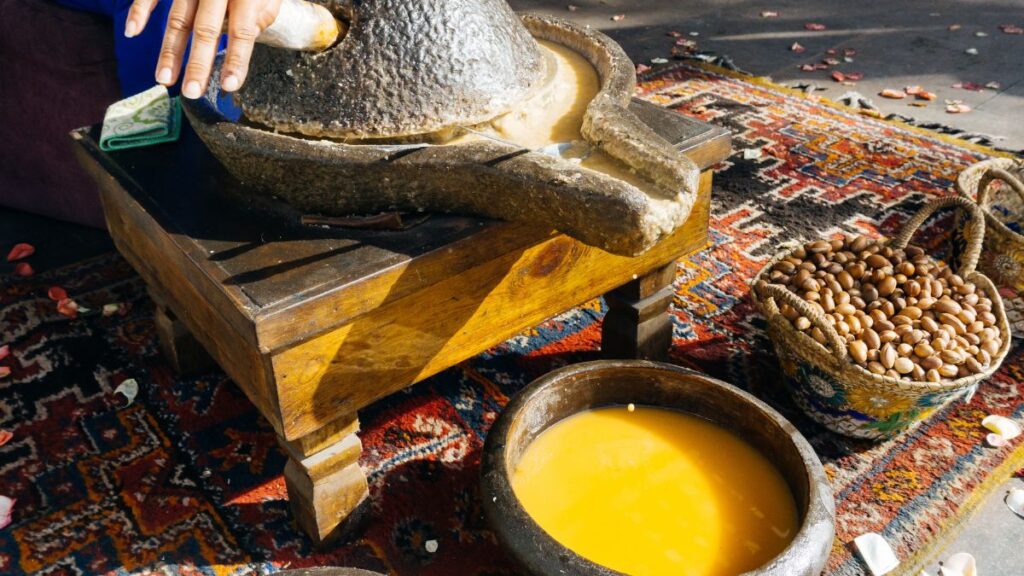
Argan oil stands out for both its beauty and food uses. You find cosmetic argan oil in Morocco used to moisturize skin and hair, while culinary versions are used to dip bread at breakfast or to top couscous and pasta. It’s a wonderful souvenir often sold in street shops, women’s cooperatives, Ensemble Artisanal, or certified pharmacies in Gueliz.
Prices average 50-70 MAD (5-7 EUR). You’ll see local argan oil products in shops across the Medina and cities like Fes, Essaouira, and Marrakech stock it. Many locals pick up amlou, a tasty spread made with almonds, honey, and argan oil. To get the real deal, look for places using age-old harvest and press methods from native argan trees. Some even offer traditional Moroccan soap alongside the oil. These are a must bring from Marrakech souvenirs.
3. Berber Carpets & Rugs
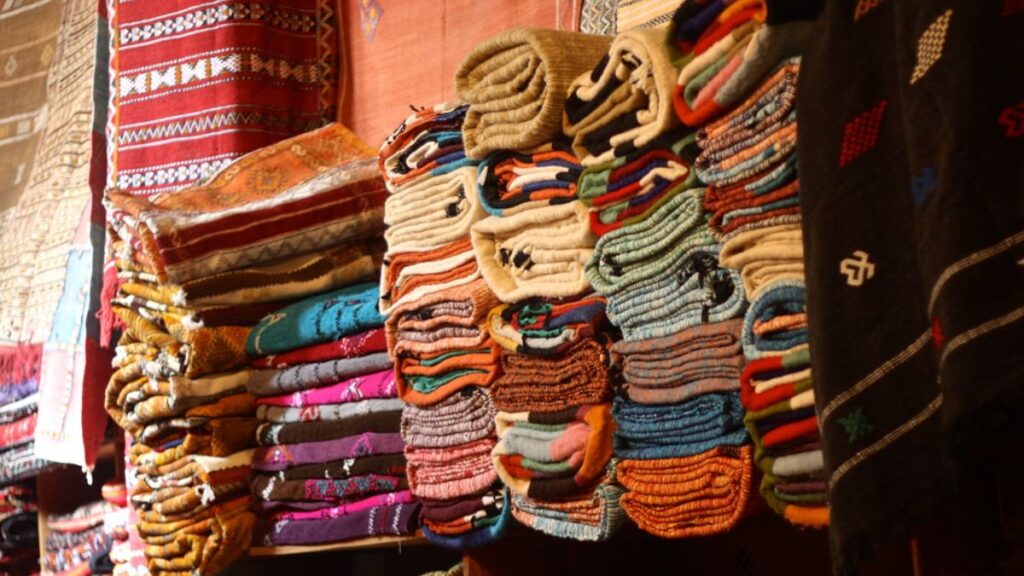
Berber rugs and carpets stand out for their handwoven build, bold patterns, and bright colors. You find them in Moroccan markets like the bustling Souk Zrabia, carpet shops in the Medina, or the Ensemble Artisanal.
These Moroccan rugs, common across North Africa, often cost more than expected because skilled artisans spend months or even years making each one. Each carpet shows off either classic or modern designs, shaped by knotting style and fabric texture.
Even a traditional boucherouite rug or smaller piece can hold as much value and work as larger ones. Price is often negotiable, and haggling works best when done with respect. These carpets make for an essential Morocco souvenir, rich in culture and craftsmanship.
4. Leather Goods
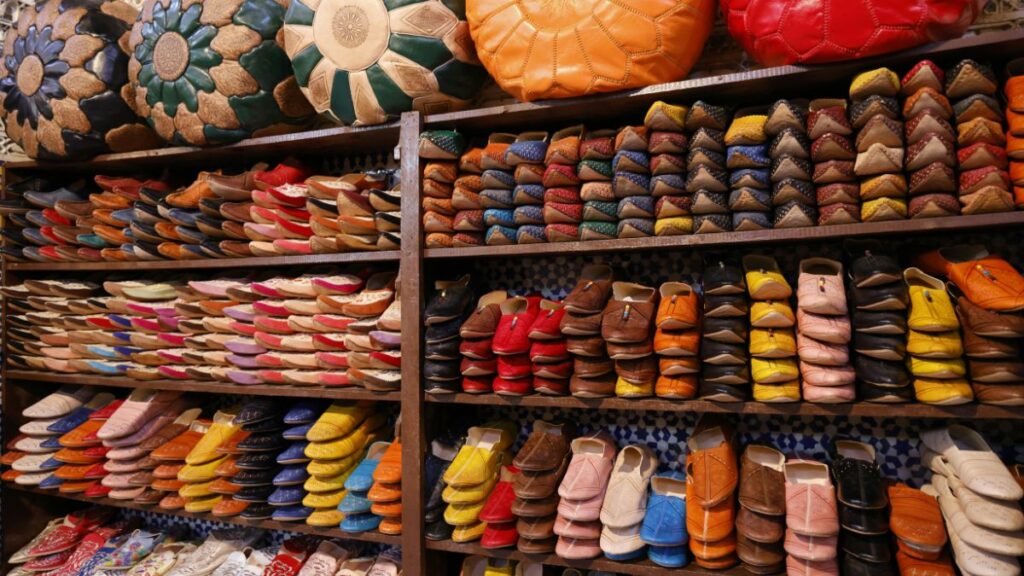
Today, Morocco leather goods are known for their suppleness and vibrant hues. You find bags, babouches, and fabulous leather poufs everywhere in Marrakesh. Boutiques in the famous tanning souks like the Tanners’ Quarter and Rue Mouassine are stocked with tier-upon-tier of hand-etched wallets, belts and totes.
Crafting traditional leather runs deep here, inherited by artisans who revere time-honored techniques. Both Marrakech and Fez continue these practices in their iconic leather souks.
Buying means you have to bargain, but you can detect authentic quality by silky seams and full aroma. These are distinctive souvenirs we love for their perfect mix of fashion and heritage.
5. Moroccan Spices
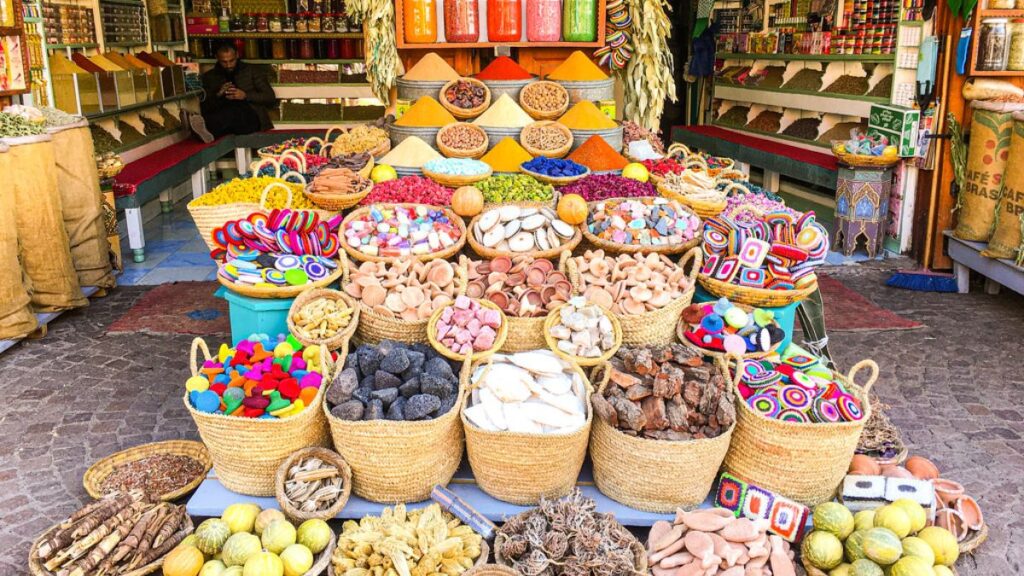
Moroccan foods shine thanks to their use of different spices like ras el hanout, saffron, and preserved lemons. You’ll spot heaps of coloured spices and whole spices stacked into neat pyramids at spice stalls in the souvenir souks, especially around Rahba Kedima Square.
Saffron, grown mostly in Taliouine, costs about 50-70dh per gram and is prized for both flavor and health perks. Dry mint runs cheaper at 10dh for 100 grams.
Locals use spices like cumin, coriander, and cinnamon daily, both in food and for medicinal uses. Prices and quality shift across regions, so comparing vendors helps.
6. Ceramics & Pottery
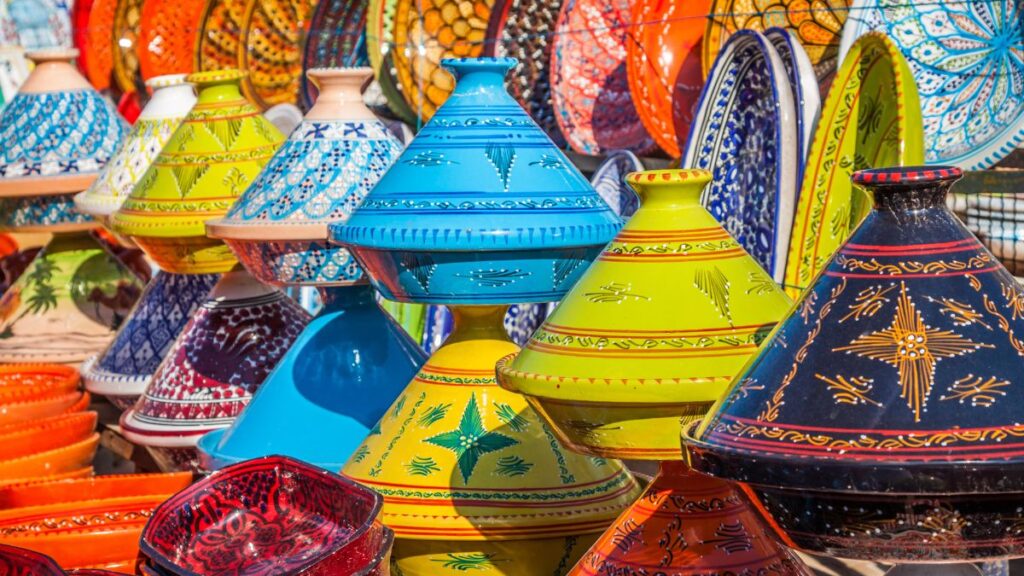
Now, ceramic goods stand out for their hand-painted bowls, plates, and tajines showing Moroccan flair. Shops in the Mellah, Ensemble Artisanal, or stalls near Place des Ferblantiers display pieces with bold color, etched plates, and unique items featuring exquisite Moroccan craftsmanship.
Many artists work on-site, letting you see hand etching up close. Prices swing from 100–500dh for plates, while custom pieces can be readied in days. Small tile hangings run a few hundred dirham, but large tile fountains fetch thousands.
Fez and Tetouan lead for quality tiles, with each pattern crafted by masters after years of practice, making these works an aesthetic souvenir to cherish.
7. Traditional Tea Sets
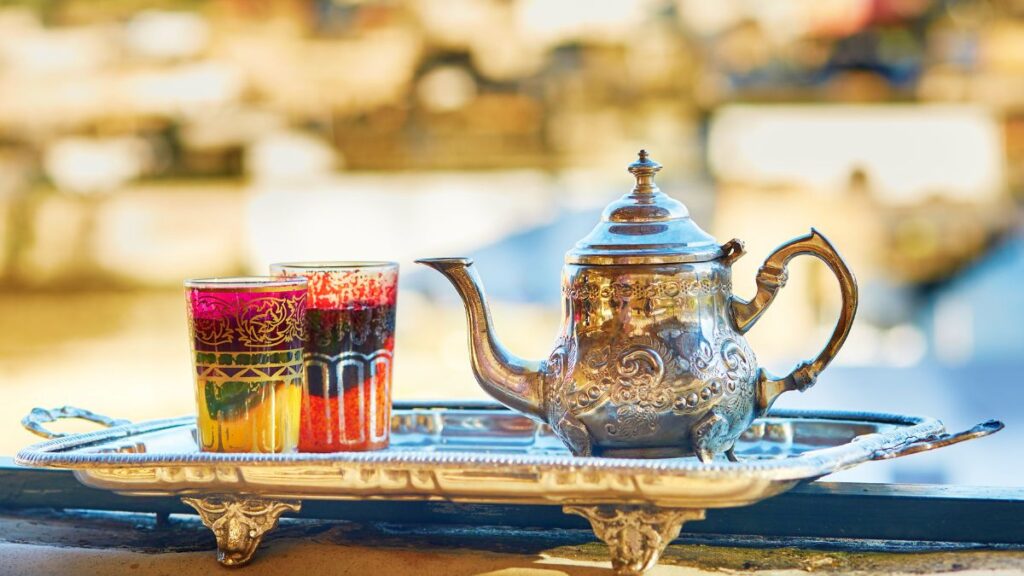
Traditional tea sets provide you with a physical connection to Moroccan hospitality and craftsmanship. You frequently see silver teapots with arabesque designs, edge-raised trays and multi-colored tea glasses such as green or blue.
Artisans poured themselves into each, and you witness this in their blend of traditional and contemporary motifs, influenced by cultural transitions and foreign supplies. Bazaars in the Medina, Souk Smata and bustling Place Jemaa el-Fnaa all have these sets available, allowing you to pick out a set that suits your preference or residence.
8. Moroccan Slippers (Babouches)
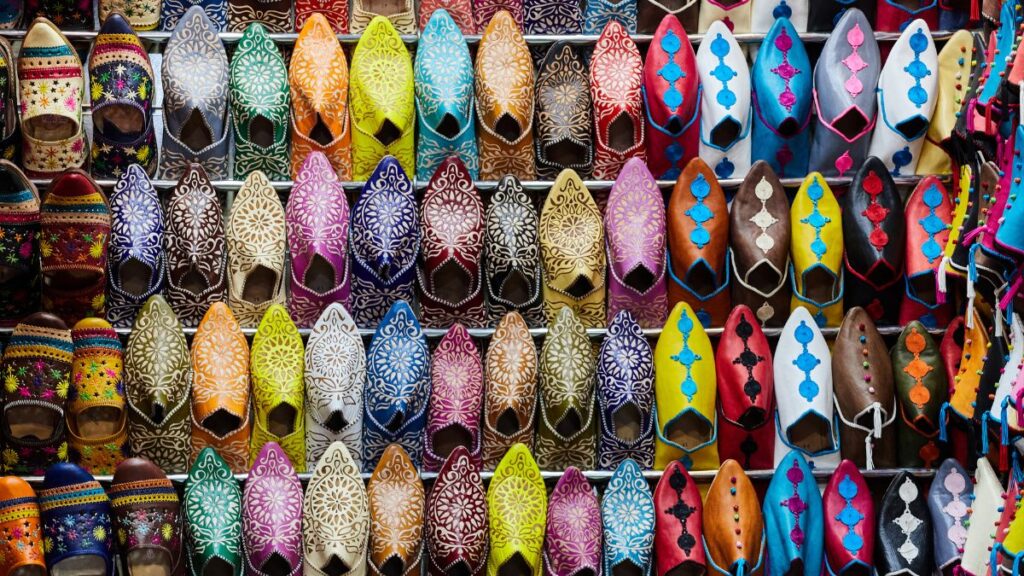
Now, what set off Moroccan slippers, or babouches, is the supple leather and spectrum of colors. There are the hand-crafted pairs with beads or embroidered designs– all of which highlight the talent of local craftsmen.
The leather frequently originates from tanneries in Fez, renowned for being both durable and fine. Souk Smata, or the slipper market, and stalls around Jemaa el-Fnaa are prime locations to locate them.
You’ll find basic styles in solid colors or daring ones with colorful stitching and tiny jewels. Prices vary based on quality and detail, so you get both inexpensive and luxury pairs.
9. Jewelry & Berber Silver
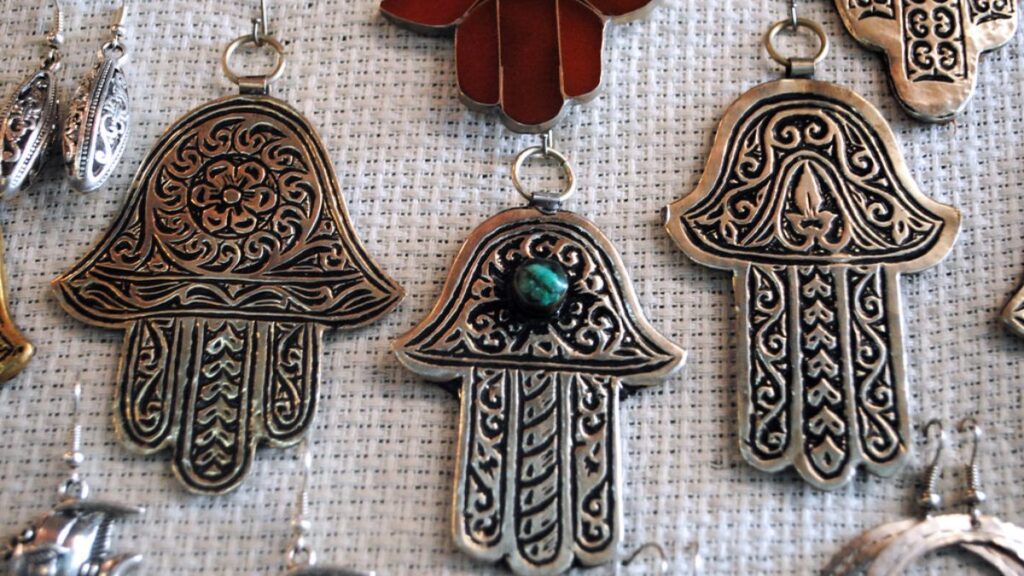
Then of course, there’s Berber silver jewelry, which is notable for its striking handmade appearance and strong ties to indigenous culture. You discover silver, gold, amber or turquoise-embedded necklaces, rings and bracelets, frequently inscribed with engraving of Berber narratives.
All over the Mellah and Medina, shops carry everything from new pieces to antiques. Prices vary depending on material and craftsmanship so bargaining know how comes in handy.
Some may not be authentic—so inquire as to the source or search for hallmarks.
10. Spiced Sweets & Pastries
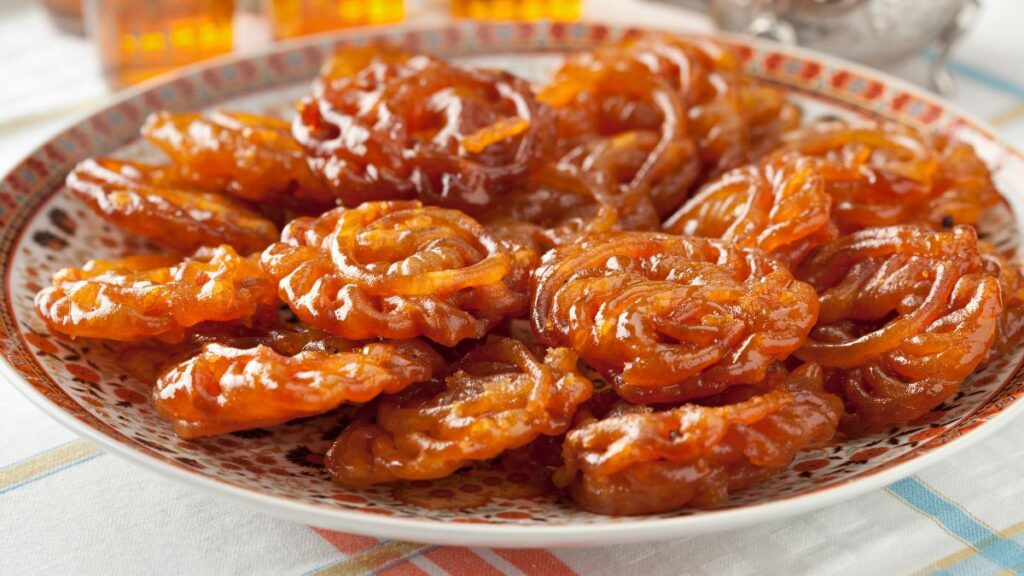
Marrakech’s spiced sweets and pastries captivate with their intensity of flavour and rich fragrances. Chebakia, deep-fried, flower-shaped, honey, and sesame goodness, delivers a sticky crunch.
Gazelle horns deliver a gentle nibble of almond paste and orange blossom. Nougat and makroud blend nuts & honey in a sweet, nutty bite. You discover these delicacies fresh at Gueliz patisseries, Jemaa el-Fnaa stalls and Medina bakeries.
With the exotic flavors of saffron, cinnamon and argan oil shaping every bite, we make every piece a flavor of Moroccan hospitality and tradition.
Tips for Shopping in Marrakech
Shopping in Marrakech exposes you to myriad sights, smells and sounds. You’ll notice vibrant hues, overhear hasty bargaining and witness handmade goods. Vendors assume you will haggle.
Attempt to open with a warm lower bid. Shops close at mid-day and open again in the evening, so schedule your visit accordingly. When you shop, verify quality of goods such as leather or pottery by touch and weight.
Local currency is generally favored, although certain locations accept card payments. Never pay full price – always ask if they are handmade or factory-made for honest value.
Book an Ubigi eSIM data plan for Morocco
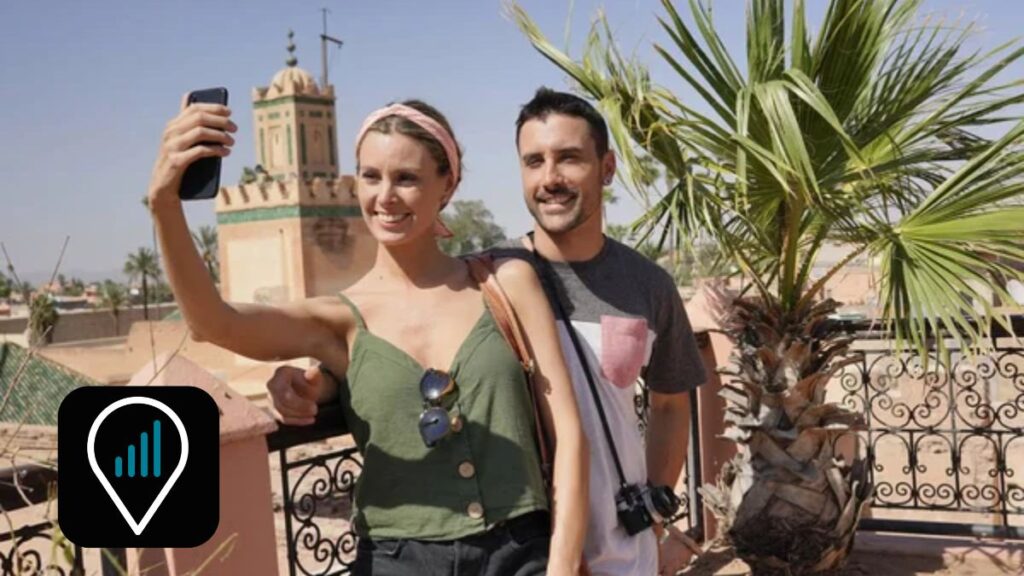
Opt for an Ubigi eSIM data plan and enjoy quick, reliable connectivity as you navigate through Morocco. With eSIM, you bypass expensive roaming fees and no longer have to physically swap out your SIM card. That is, you maintain your primary number and skip the little plastic shards in your bag.
For travelers heading to Morocco, Ubigi offers a variety of flexible prepaid eSIM data plans to fit different needs:
- For short stays under a week or light users, you can opt for a 3GB plan. It will be perfect for quick trips or occasional browsing.
- For a two weeks stay, Ubigi provides a 10GB plan for those who expect heavier usage or sharing data via tethering.
- For maximum peace of mind, there’s an Unlimited Data plan (valid for 7 days), ideal for intensive users or those who don’t want to worry about running out of data. Check the Fair Use Policy.
Being online keeps you connected with translation, map and currency apps in markets, train stations or city squares. For instance, you might check XE for exchange rates, use Google Maps to locate your riad or open Google Translate to chat with shop owners.
Bargaining is expected
After all, bargaining is at the heart of shopping in Marrakech’s souks. You get to haggle over prices for pretty much everything– from leather slippers to handwoven baskets. Sellers anticipate you to participate, so don’t be shy.
Most things, like brass lamps or ceramic bowls, have very little fixed prices. Bargaining gets you a good price and allows you to find out more about the products. A quick grin and some nice chit chat establish a positive mood. Sellers tend to start out high, so you can respond with a courteous lower offer.
Carry cash
Cash is king in Marrakech, so it will help you shop with no hassle. Most small shops, like spice stalls or craft booths, only accept cash. You could spot some colorful rugs or hand-carved bowls that you’d like, but card payment isn’t an option.
Local cafes and street food frequently operate the same way. With Moroccan dirhams in your wallet, you’ll have a mint tea or souvenir pouch at the ready. Bank machines are prevalent in the city center, but scarce in the souks.
Authentic quality at fixed prices
Authentic quality at fixed prices stands out at places like Ensemble Artisanal or certified cooperatives in Marrakech. You see clear price tags and know that the goods come from local artists who use traditional skills.
No need to haggle or worry about paying too much. Shops like these offer handwoven rugs, brass lamps, and painted ceramics —just a few of the 10 souvenirs to bring from Marrakech.
For example, at Ensemble Artisanal, you find leather bags, carved wood boxes, and pottery, all with labels showing their origin. The staff often answer questions about how things are made, so you know what you’re buying.
Conclusion
Marrakech provides you with an abundance to bring back with you. You stroll the souks and discover lanterns that flicker, carpets with daring strokes, and bottles of new spices. The air stinks delightful of mint tea and pastries. Your bags fill up quickly. These mementos provide an authentic flavor of the city. You get big and small for all budgets! All of them display a slice of the city’s life. You learn about the artisans, hear their tales, and witness their craft.
Here are 10 souvenirs that you can bring from Marrakech — Seek out good deals, genuine merchandise and the greatest worth to you! Do not rush, have fun looking, and choose whatever suits you best. To prepare for your journey, reserve your Ubigi eSIM and shop with confidence.

Frequently Asked Questions
What are the best souvenirs to buy in Marrakech?
Moroccan lanterns, argan oil products, Berber carpets, leather goods, spices, ceramics, tea sets, babouches, silver jewelry, spiced sweets. Well-loved, truly authentic and symbolic of Marrakech’s culture.
Is it safe to buy souvenirs at local markets in Marrakech?
Yep, it’s pretty safe if shopping at the stalls and souks that have a good name. Just always check quality, keep your wallets safe and always ask for a receipt where possible!
Can I bargain when shopping for souvenirs in Marrakech?
Yes, you have to haggle in Marrakech markets. Begin with a low bid and deal gently. It is customary and can aid you in obtaining superior prices and bring from Marrakech your favorite souvenir.
Should I carry cash when shopping in Marrakech?
Yes, you should bring cash. A majority of the small shops and market stalls in Marrakech don’t take credit cards. Carry Moroccan dirham in small bills.
How do I know if a souvenir is authentic?
Purchase from trusted stores or official cooperative organizations. Seek quality craftsmanship, inquire about where it’s from. Steer away from too-good-to-be-true deals.
How can I stay connected while shopping in Marrakech?
Reserve an Ubigi eSIM data plan for Morocco. It provides you with dependable mobile internet, so you can consult maps, translate, or check reviews on the fly.
Are there fixed-price shops for souvenirs in Marrakech?
Yeah, a few stores have set prices, particularly for premium quality items. These shops sell genuine items and you don’t have to haggle. Seek out shops with obvious pricing.




